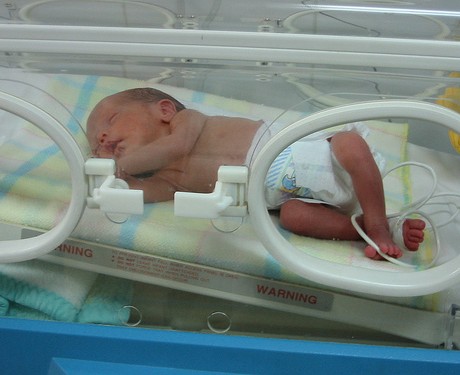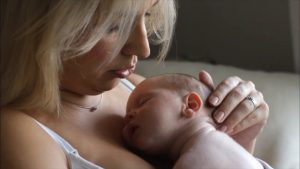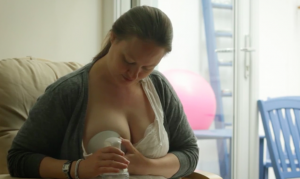
Your baby might need special medical care if he was:
Born premature (babies can now survive from 23 weeks gestation, but if they are born before 34 weeks they may need support with breathing, feeding and regulating their temperature initially).
Neonatal Intensive Care Unit, NICU, provides special incubators, or temperature- controlled ‘hot beds’ to keep babies warm and help protect them from infection. Incubators are fitted with respirators that help some poorly or very small babies to breathe and drips that deliver food, such as glucose, and fluids intravenously, via a cannula and a tube directly into a baby’s bloodstream.
Most babies in NICU will need help with feeding but not always intravenously, instead, they have a little tube up their nose that leads down to the stomach. This means that nurses or parents can give them a feed of the mum’s breastmilk, donor milk or formula milk for premature or sick babies.
There will be a very strict cleanliness policy and if you are able to cuddle, feed or change your baby you will need to wash your hands thoroughly with antibacterial cleaner as the babies are very susceptible to infection.
Your baby will be surrounded by monitors and tubes which can be frightening for parents at first. Staff understand this can be a stressful time for you and want you to feel as involved and as comfortable as possible. They value you as a vital part of your baby’s care and will happily answer questions if you are ever unsure about what is going on.
Also known as SCUBU, this is a less intense form of care for babies that need less medical support.
Instead of incubators there are usually specialist beds like hot cots and babies are supported with not all but some of the following:
If your baby was in NICU, he will be transferred to SCUBU as he gets stronger and more independent. This can worry for parents as it seems a lot less ‘medical’, but rest reassured babies are only transferred to SCUBU when they no longer need intensive care (if the unit was overcrowded, they would have been transferred another hospital neonatal unit). So try to feel confident and enjoy this sign that your baby is getting better.
It is very upsetting and stressful if you have to be separated from your baby whilst they are looked after in neonatal or special care. This is made even more difficult if you are unwell, and recovering from an emergency caesarean for example. You may need some help getting to see your baby and recovering at the same time. The good news about being in a hospital is that you can quickly be taken to your baby, even at night-time for feeds and cuddles. The best way for you both to recover is to spend as much time as possible with your new baby; with lots of skin-to-skin contact, cuddling and feeding.
If you have been discharged from the postnatal ward and are breastfeeding your baby or expressing and establishing breastfeeding you can ask if your hospital has family rooms so you can sleep on site as night feeding and expressing is very important for both you and your baby to get breastfeeding and milk production going.
If your baby needs surgery, you will also have the added stress of waiting while your baby is in theatre and then helping him to recover afterwards. We recommend that you contact a support group like Bliss or Tommy’s as they can help you understand your baby’s particular treatment as well as connecting with other parents in your position, but talk to staff first. You will also probably make strong connections with other parents on the ward who are going through similar difficulties. This can be a real help, but it can also be tough, especially if you learn that another baby there is critically ill.
If you have had a difficult birth and are in recovery, you may not be able to get to your baby. It can be reassuring to have your partner go with your baby and have skin-to-skin contact with him while you are in recovery. If your baby is too ill, he may not be able to cuddle the baby but he can talk to him and may be allowed to put clean muslin cloth that has been next to your skin in the cot so that your baby can smell you. The hospital staff will make sure that you are reunited with your baby as soon as medically possible. In the meantime, they will bring you a photo of your baby safe in NICU.
New mums can feel really frightened and useless if their baby is taken to special baby care and seems to be being looked after by lots of ‘strangers’. However, you are your baby’s mum and there are lots of things you can do to help your baby that the medical staff are unable to do.

As soon as possible, lay your baby on your chest in skin-to-skin contact; this is known as ‘kangaroo care’. Your baby will be placed on your chest like a little tree frog and you can feel her there, smell her and talk to her. There are lots of benefits for new-born babies. It helps to relax and calm them and help with their transition from the womb to the outside world. Skin-to-skin contact regulates a baby’s body temperature and can also stimulate your baby to feed, which will, in turn, stimulate your milk production and your bonding hormone oxytocin. Finally, there is more and more evidence that babies benefit from lying on their mum’s skin so that their skin can be colonised with your ‘friendly’ skin flora (bacteria). The more time you can spend cuddling, smelling, feeding and talking to your baby, the sooner you will begin to feel like a mum to this new baby.If your baby is being monitored you will hopefully be able to see his heart rate and breathing settle when he is in skin contact with you.

Colostrum
Express some colostrum so that your baby can receive the first feed. Your colostrum is packed with the perfect fuel for your baby to grow stronger and it even coats the lining of her gut to protect it from infection. It is really helpful to begin expressing within 2 hours of your baby’s birth as this is when he would have fed had he remained with you. This will help ensure that you kick start your milk supply.
Provide breastmilk
This is really important for babies in special care as breastmilk provides much-needed protection against infection to which premature babies are more prone. Because they have been born early premature babies will have missed out of the transfer of antibodies that pass through your placenta in the last months of pregnancy so are particularly vulnerable. However, as babies in special care are often not able to feed effectively, mums are encouraged to start by expressing breast milk to really get their production going. Most units have fantastic electric pumps, which will allow you to express your breastmilk quickly (from both breasts at the same time) and quietly throughout the day and night. Where possible it is important to provide fresh breastmilk for your baby as this will contain the most up to date antibodies which will protect them from infections on a daily basis. Expressing milk after holding baby in skin contact and allowing them to lick and nuzzle around your nipple is ideal. Ideally, you would be pumping around 8-10 times in 24 hours. The milk you express can either be fed to your baby immediately or stored for later use. The nurses and midwives will help get you so don’t worry if you are only producing a few drops at first. Initially, your expressed milk will be given to your baby as a tube feed or a cup feed, you will be able to breastfeed when she is stronger, many premature or poorly babies master breastfeeding quite quickly. Your baby may start with a mixture of breastfeeds, tube feeds, syringe feeds and cup feeds during the day.
If you are initially not able to express much breastmilk, the hospital can provide donor human milk in many cases. This milk has been carefully prepared and pasteurised and is the best choice for baby until you are able to pump a little more of your own milk.
Donor or formula milk
Because of the huge importance of breastmilk for premature babies, most doctors will try to wait until you can express your milk or access donor milk rather than give your baby formula immediately. If there is no donor breast milk available, your baby may need some to be given some milk specially formulated for premature babies until you are able to provide all the milk she needs. Again in the early days, these feeds will be given via a tube, cup or a bottle if you choose to bottle-feed your baby.
Sometimes premature babies are given human milk mixed with fortifiers that help them catch up on some of their missed nutrients.
Tube feeding
If your baby is born premature or unwell she may lack a strong sucking reflex, which may mean she tires easily during feeds. So she will have a little tube that goes up her nose and into her food pipe (oesophagus) so that milk can be given directly to her stomach using gravity and bypassing the mouth (so no choking). You will be shown how to tube feed your baby. It can be a bit scary at first but you’ll get the hang of it. A nurse will help you learn how to look after the tube.
If your baby has needed special care, then the anxiety and excitement of going home together are even greater, especially if your baby may have been in the special care unit for several weeks. Many parents worry about how they will cope without all the backup they have had over the last few weeks or months.
Try to remember that your baby (or babies) is being discharged because he is ready for life at home. You may still need to have an oxygen on hand or their feeding tube might still be attached to make sure you chat through your baby’s extra needs and remember you will have lots of support in the community special baby care team.